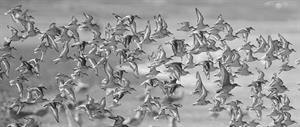
PUMPA - SMART LEARNING
எங்கள் ஆசிரியர்களுடன் 1-ஆன்-1 ஆலோசனை நேரத்தைப் பெறுங்கள். டாப்பர் ஆவதற்கு நாங்கள் பயிற்சி அளிப்போம்
Book Free DemoHas given my heart
A change of mood
And saved some part
Of a day I had rued.
A change of mood
And saved some part
Of a day I had rued.
Explanation:
In the second stanza, the speaker explains his reaction to the incident from the previous stanza. To recall, we had seen in the previous stanza that a crow had pushed down some snow dust on the speaker. It was also seated on a hemlock tree. As previously noted, it is a trivial incident. However, the speaker finds the moment philosophical and transforming`.
Following the event, the speaker observes that it had "given his heart a change of mood". As seen in the previous stanza, the speaker was going through a bad phase. He was gloomy and was probably thinking about death. Although it is unclear as to why he was gloomy, the speaker declares that his mood had changed for the better. The incident was in no way incidental; instead, it was transformational to the speaker.

The crow shaking down the snow dust proved to be transformational
One should remember that the speaker was specific that it was "the way" the crow shook down the snow dust that brought the change. Birds often migrate to warmer climates during winter, and crows are no exception. However, not all crows fly away to escape the cold. Some stay back for reasons not understood. They fall into a category known as partial migration. Writing about migratory habits in crows, ZME Science observes that "some stay right where they are, toughing out the frigid days as they best can. Others choose to move to warmer areas, returning only when the cold has faded away."*

Migrating birds
So coming back to the point, it could be the knowledge that a crow surviving through the cold winter day that made the speaker realise that he could survive through his bad days too. If the bird could live through the cold by shrugging off the snow dust, he could also shake off the unhealthy (and destructive) thoughts and live through the day. It often takes only a moment for a person to do something bad and regretful. Also, it takes only a moment to prevent the person from doing so. Hence, the moment with the crow on the hemlock tree on that winter day proved to be life changing for the speaker. The crow became an inspiration to stay and survive. In reimagining the myth around crows, the speaker invariably elevates the position of a crow from being a symbol of death and tragedy to that of life and inspiration.
In the third and forth line of the stanza, the speaker claims that the incident had 'saved some part of a day he had rued'. By changing his mood and outlook on life, he feels that a part of the day he had destroyed has been saved. So here, the concept of "save" is on two levels: the literal and metaphorical. As mentioned, a part of his day has been saved by the incident and that is the literal meaning. On the metaphorical sense, the incident had not just saved a part of his day; it had saved "his life".
The idea that "some part" of the day has been saved, in a way resonates what Benjamin Franklin had once said: "Lost time is never found again".** The speaker realises that time lost is lost forever. He had a bad day, and he had lost a part of the day being broody. Despite having been out of the mental state, he knows that the time he lost by being sad is lost and gone. He also uses the word "rued" to show that he feels remorse, and regrets for having wasted time. Nevertheless, the regret doesn't hold him back further. He doesn't remain gloomy over the fact that he had lost a good part of his day. Instead, he is glad that at least some part of the day has been saved. The usage of the tense in the line "I had rued" explains that he has put all the lamenting behind (in the past) and is moving forward with the time that has been given. He knows that he had lost time. Yes, it is regrettable that he had almost ruined a part of his day, and he wishes that he was out of his gloomy state sooner. But, he is also wise enough to realise the importance of time, and hence, he doesn't intend to relive his mistake.

The encounter with nature gave the speaker a change of mood
To recollect, let us look at the key points from the stanza:
- The incident brings a transformation in the speaker
- It changes his mood for the better
- Some part of his regrettable day gets saved
Meanings of difficult words:
S.No | Words | Meanings |
1 | Heart | The centre of a person's thoughts and emotions, especially love, compassion, or loyalty |
2 | Mood | Suggestive of a particular feeling or state of mind |
3 | Save | Keep safe or rescue (someone or something) from harm or danger |
4 | Rued | Bitterly regret (something one has done or allowed to happen) and wish it undone |
Reference:
National Council of Educational Research and Training (2007). First Flight. Dust of Snow-Robert Frost (pp. 14). Published at the Publication Division by the Secretary, National Council of Educational Research and Training, Sri Aurobindo Marg, New Delhi.